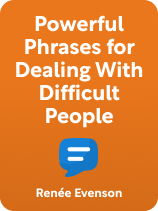

This article is an excerpt from the Shortform book guide to "Powerful Phrases for Dealing With Difficult People" by Renee Evenson. Shortform has the world's best summaries and analyses of books you should be reading.
Like this article? Sign up for a free trial here.
Do you have difficult people in your life? Are you looking for ways to improve your relationships?
Renée Evenson’s book Powerful Phrases for Dealing with Difficult People offers valuable insights on the importance of conflict resolution. Because conflict is inevitable, conflict resolution skills are a must—at work and at home.
Read more to discover how to transform challenging situations into opportunities for growth and stronger relationships.
Conflict Resolution Is Part of Life
The importance of conflict resolution is highlighted by Evenson’s assertion that conflict is an inevitable part of life. At some point, someone you see regularly is going to get in the habit of doing something you find harmful, annoying, or unproductive, and you’re going to want them to stop. This is particularly common at work. You can choose your friends, but you don’t choose your co-workers; you’re stuck with whomever’s there.
According to Evenson, mature conflict resolution is necessary to maintain collaborative relationships. When two people openly discuss a conflict in a way that demonstrates mutual respect, it helps them realize they can trust each other to help meet each other’s needs. In this way, conflicts can leave relationships stronger than before.
The skills required to responsibly resolve conflicts and maintain productive working relationships are rare, so they’re a great way to distinguish yourself as a uniquely valuable employee. Evenson points out that employees with excellent interpersonal skills are often promoted over those who may have superior technical knowledge or job-specific skills.
(Shortform note: Other experts agree that managers often promote people with strong interpersonal skills rather than those with purely technical skills. That said, they contend that conflict resolution skills are just one aspect of the broader skill of emotional intelligence, which also includes self-awareness, the ability to manage yourself, and understanding social dynamics. Such skills will help you succeed by making it easier for you to persuade your co-workers to accept your ideas and innovations.)
| Conflict Is Inevitable in Romantic Relationships Evenson argues that conflict is particularly common at work because you don’t get to choose your co-workers. However, in How to Be an Adult in Relationships, David Richo contends that conflict is inevitable in romantic relationships, too (even though many people choose their partners). After the initial honeymoon phase in which couples fool themselves into thinking that the other person is perfect, they’ll inevitably enter a discordant phase filled with conflict. Couples must resolve these conflicts for the relationship to survive. That said, instead of seeing disagreements as purely negative, Richo (like Evenson) frames them as a chance to strengthen the relationship. Specifically, he claims that by surfacing and accepting each other’s flaws through conflict, couples can foster greater understanding and intimacy.How can you do this? You can use the acronym GREAT to remember Richo’s advice for how to bond with your significant other, even when you’re fighting: G – Gratitude: Tell your partner how much you appreciate them. R – Respect: Support your partner’s right to disagree with you about how to live. E – Engagement: Express sincere interest in what your partner says. A – Affirmation: Tell your partner that you approve of who they are, virtues and flaws alike. T – Tenderness: Show your partner how much you love them through physical touch and kind words. |
What Happens When You Avoid Conflict
According to Evenson, one major reason that conflict resolution skills are important is that avoiding conflict often ends in disaster. Most people shy away from conflict because it’s uncomfortable. However, if you try to ignore a problem and pretend you’re unbothered by it, your frustration and other negative emotions will only grow stronger. This will make the relationship increasingly strained and dysfunctional as time goes on.
Additionally, Evenson contends that your pent-up feelings may eventually become uncontainable, and you’ll rant at the other person in a way that’s inappropriately intense. This kind of outburst can permanently sour a relationship.
(Shortform note: In Dare to Lead, Brené Brown explains that if you suppress your negative emotions instead of expressing them in a healthy way, it could manifest in many different unhealthy ways—not just an angry explosion at the person frustrating you. For instance, as your negative feelings grow, you might develop a dependence on something that numbs you, such as food, alcohol, or gambling. Or, you might resort to the defense mechanism of toxic positivity, where you outwardly pretend to be unreasonably happy about everything. While this may help you avoid conflict, it will also cause others to perceive you as inauthentic, preventing you from building trusting relationships.)
We’ve established that proper conflict resolution is a necessary part of any healthy relationship—at work or otherwise. In her book, Evenson divides the process of conflict resolution into five stages:
- Stage #1: Plan How You’ll Resolve the Conflict
- Stage #2: Establish Mutual Empathy
- Stage #3: Clarify the Issue at Hand
- Stage #4: Suggest a Potential Fix
- Stage #5: Make a Final Decision
| An Alternative Process Centered Around Needs Evenson’s method isn’t the only effective step-by-step conflict resolution process. For example, in Nonviolent Communication, Marshall B. Rosenberg describes a five-step process based on a framework he calls nonviolent communication (NVC): • Step #1: Express your needs • Step #2: Identify the other person’s needs • Step #3: Verify that both of you accurately understand each other’s needs • Step #4: Provide empathy • Step #5: Propose strategies that meet everyone’s needs While both conflict resolution processes involve empathizing, defining the issue, and finding solutions, the NVC process places more emphasis on identifying needs than Evenson’s method. According to Rosenberg, needs are the physical and psychological resources that people require to survive and thrive. In contrast, strategies are the specific actions that can fulfill those needs. During conflict, people often demand that the other person accept their strategies. This often leads to an unproductive stalemate, as neither party wants to accept the other’s strategies. Rosenberg’s method is designed to avoid this trap. For instance, you might tell your significant other, “You have to text me every hour when you’re out with your friends.” However, demanding that they accept this strategy will likely make them defensive and less likely to look for a workable solution. Instead, if you say, “I need to feel secure in my relationship,” your significant other can work with you to find a more mutually satisfying way of meeting that need. Evenson’s method focuses more on strategies than Rosenberg’s. Evenson recommends centering your discussion on a single issue and strategies for solving it, rather than taking a complete inventory of everyone’s needs. |

———End of Preview———
Like what you just read? Read the rest of the world's best book summary and analysis of Renee Evenson's "Powerful Phrases for Dealing With Difficult People" at Shortform.
Here's what you'll find in our full Powerful Phrases for Dealing With Difficult People summary:
- The downsides of avoiding conflict
- How to keep people from getting defensive
- What to do before you attempt conflict resolution






